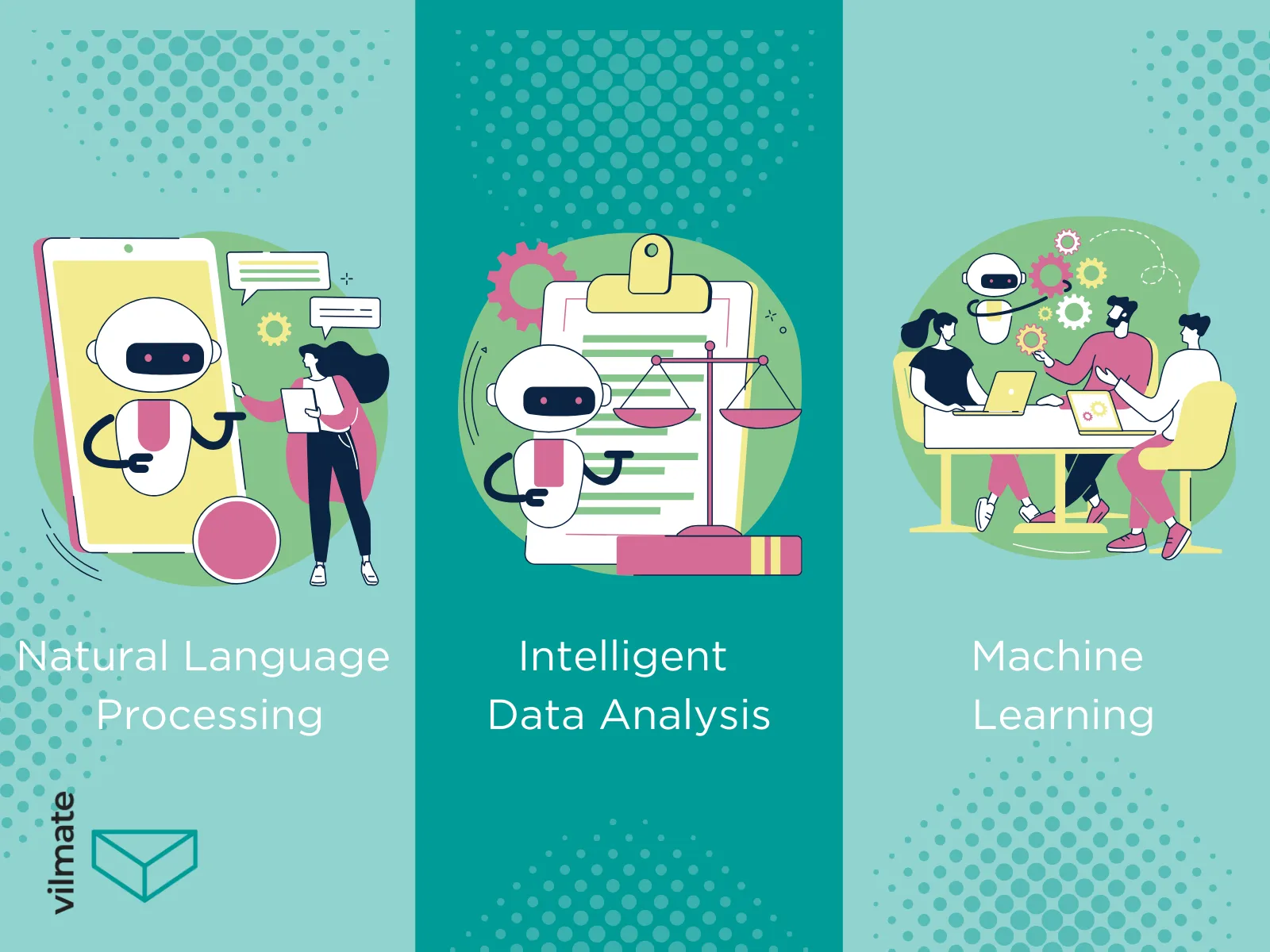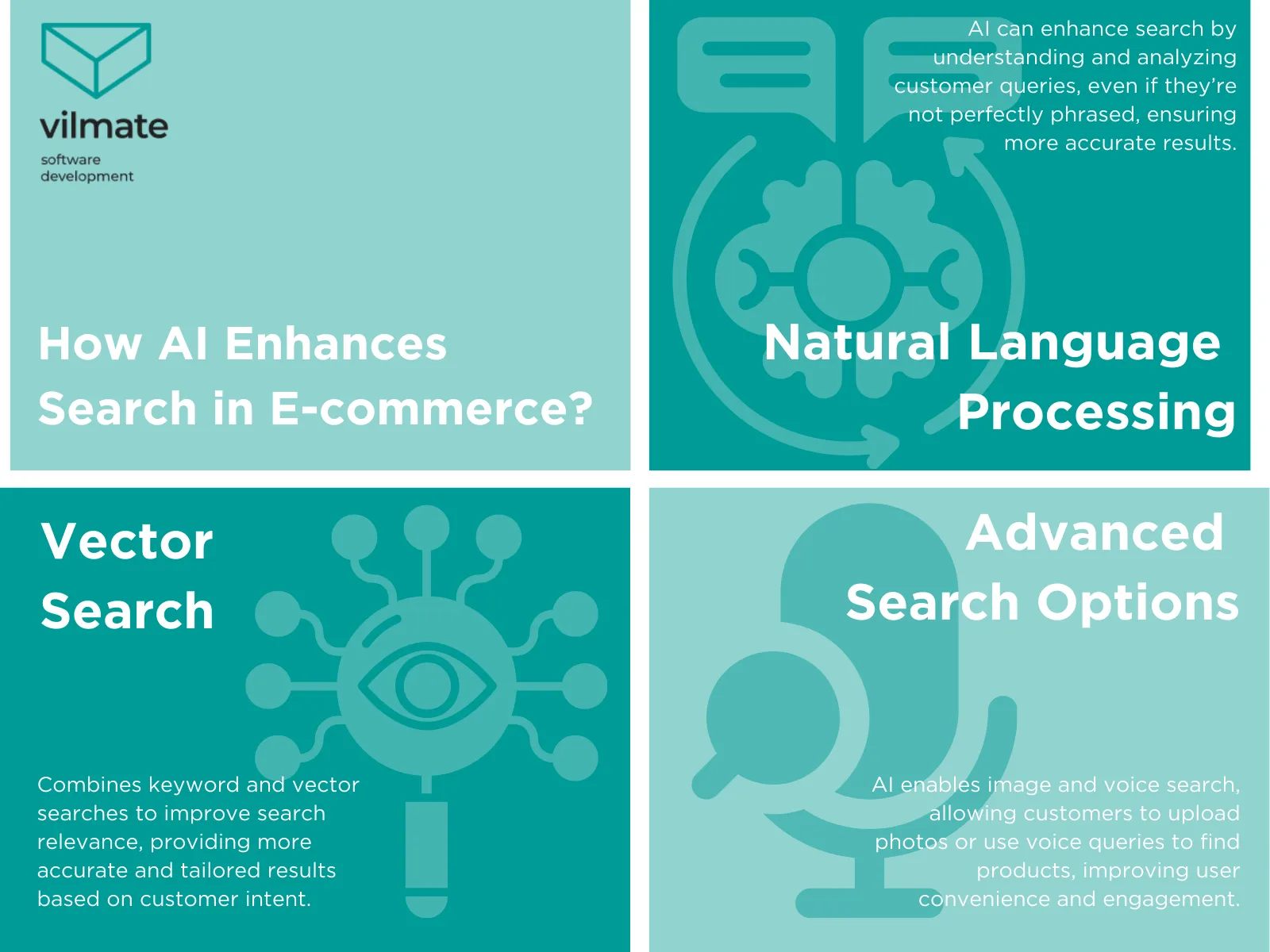Today, artificial intelligence (AI) captivates everyone, from IT companies to large and small businesses and ordinary people. As you may know, this new technology has unlocked countless possibilities that seemed like pure fantasy just ten years ago. AI is being integrated into the e-commerce sector more than ever as business owners seek to boost sales and are eager to experiment with innovative solutions to reach their goals.
Recently, Vilmate has significantly increased its investments in AI and machine learning. We now offer implementation services primarily for e-commerce websites and applications. We have explored the advantages and disadvantages of artificial intelligence in this field and would like to share our insights with you. In this article, you will discover fascinating information about AI in e-commerce. We will cover the main benefits of these solutions, provide examples of their application, and share interesting statistics.
Advantages of Artificial Intelligence in E-Commerce
Artificial intelligence attracts customers simply by being present. Clients find it intriguing to interact with technology that mimics human behavior. However, AI is more than just an expensive novelty; it is a powerful tool influencing many behind-the-scenes aspects.
In e-commerce, AI offers several key benefits:

- AI enables intelligent data analysis, allowing businesses to process large amounts of information and make accurate predictions.
- AI employs machine learning, which uses algorithms to gain experience and apply that knowledge effectively.
- AI incorporates natural language processing, allowing for interpreting human speech and facilitating interactions with customers.
These capabilities improve business-customer interactions, enhance user engagement, develop effective strategies, and optimize staff performance.
Let’s explore the main advantages of using AI:
- Increased Sales: AI enhances personalization and targeting, helping businesses recommend products that interest customers. This approach leads to higher conversion rates and increased sales.
- Enhanced Efficiency: AI algorithms can automate routine tasks like order processing, inventory management, and customer support. These features save time and reduce operational costs.
- Improved User Experience: AI analyzes customer behavior and predicts their needs, making in-store interactions more convenient and enjoyable.
- Accurate Demand Forecasting: AI predicts future trends and demand, allowing businesses to plan their inventory better and minimize excess stock or shortages.
- Optimized Marketing: AI algorithms can analyze advertising campaigns and help adjust them to maximize return on investment (ROI).
These advantages are appealing but don’t give a complete picture of AI’s potential. You may be interested in specific examples of how artificial intelligence can be used in e-commerce.
7 Applications of AI in E-Commerce
We want to emphasize that there are many more ways to apply AI technology in e-commerce. The possibilities are limited only by your imagination. Here, we highlight some of the most common and interesting AI solutions to showcase the variety of opportunities this technology offers.
1. Improved Search
Search functionality on websites or apps is crucial and must be well implemented. If customers cannot quickly find what they need, you risk losing potential sales. Modern search algorithms often do not meet all customer needs, which is where artificial intelligence can help.
Natural language processing is a key feature of AI that can enhance search capabilities. AI can understand and analyze customer queries, even if they are not phrased perfectly.

Another strategy you can use is to assist customers in writing their queries by offering automatic error correction and synonym suggestions.
AI-based search is also enhanced by using vectors. Vectors are a new technology combining keyword and vector searches within a single query.
Additionally, you might consider implementing image search or voice query options. For example, a customer could upload a photo of an item they saw, and your search could suggest the exact product or a similar alternative. Making communication between customers and your website more convenient will give you a significant competitive advantage.
2. Personalized Recommendations
E-commerce sites often rely on content managers to manually add recommended products or use basic algorithms that analyze product data. This method doesn’t effectively offer customers what they are genuinely interested in; it mostly relies on guessing their preferences.
Artificial intelligence changes the game by analyzing vast amounts of data. AI can examine customer behavior and suggest products based on similar scenarios. This access to data also helps staff sell products and services more effectively, as they have all the necessary information about each customer.
People generally appreciate a personalized approach; with AI, you can provide that experience to every customer.
3. Effective Pricing
Artificial intelligence can predict events well because it can analyze thousands of factors and scenarios. With AI, you can offer timely promotions that are likely to succeed.
AI can also analyze competitor pricing in e-commerce, allowing you to provide truly competitive market prices.
You can use AI’s capabilities for various financial analyses, including promoting products that need to sell quickly. Think about the specific challenges you want to tackle. We are confident that Vilmate specialists can help you integrate the right features to achieve your goals.
4. Advanced Logistics
Artificial intelligence greatly enhances logistics management and supply chains in e-commerce. AI can optimize warehousing, inventory management, and delivery processes by analyzing data and predicting demand. This approach helps reduce delays, lower storage costs, and ensure timely customer order delivery.
AI also improves vehicle routing, leading to shorter delivery times and reduced logistics expenses. The algorithms consider factors such as traffic, weather, and available routes to recommend the most efficient solutions.
While AI may not replace an entire logistics department, it will undoubtedly be a valuable tool for employees.
5. Enhancing Security
Artificial intelligence can greatly improve the security of e-commerce platforms. Machine learning algorithms analyze user behavior and detect suspicious activities, which helps prevent fraud, such as data theft or financial manipulation. AI can also monitor transactions for anomalies, quickly identifying and blocking potentially harmful operations.
User security is essential for any website or application. AI helps build user trust and prevents data breaches, which can damage a business’s reputation. Remember that cybercriminals already use artificial intelligence for attacks, so the best defense is to use the same technology against them.
6. Automation and Reduction of Operational Costs
AI helps automate many routine tasks, such as order processing, handling returns, and responding to common customer inquiries. This technology reduces the workload on staff and improves the overall efficiency of the business. AI-driven automation cuts costs and reduces errors that can happen with manual tasks.
7. Optimizing Customer Support
Artificial intelligence enhances customer support through chatbots and virtual assistants. These tools can quickly answer frequently asked questions, assist with orders and returns, and provide product recommendations. Additionally, AI can analyze customer requests and escalate more complex issues to a human representative when a personal touch is needed. This approach streamlines operations and enhances service quality, allowing each request to be addressed more quickly and accurately.
Overall, chatbots are becoming a popular choice in e-commerce. We recommend exploring this area further to stay competitive.
We have mentioned just a few key applications of AI, but these examples already highlight the real advantages of the technology. Now, let’s talk about the actual numbers—how has artificial intelligence impacted e-commerce so far?
AI in E-Commerce: Statistics
First, it’s important to note that e-commerce is the clear leader in adopting artificial intelligence. For example, as of 2019, 40% of companies in the U.S. using AI-based chatbots are in retail.

A survey by McKinsey found that 79% of respondents believe artificial intelligence has positively impacted sales. While the additional revenue varies, it averages around a 20% profit increase.
How does revenue increase? This question doesn’t have a straightforward answer, as different companies find unique ways to implement AI. However, data indicates that artificial intelligence boosts conversion rates by 15-20% and reduces lost sales by 65%.
We have dedicated a separate article to successful AI use cases by companies. In that article, you will find interesting solutions for e-commerce, and you might want to follow their examples. How can you do this?
How to Prepare for AI Integration in E-Commerce
Integrating AI into your e-commerce business requires a strategic approach to ensure you get the best return on investment. Here are the key steps to get started:
1. Identify Priority Tasks and Goals.
Before implementing AI, clearly define the tasks you want to improve. Possible goals include:
- Personalizing the customer experience
- Optimizing product search
- Increasing sales through recommendations
- Improving logistics
- Enhancing customer support
Focus on the most important issues, as solving these will provide the greatest benefits.
2. Assess Available Data
AI relies on data, so evaluate what you currently have. Necessary information may include customer behavior data, transaction records, and website interactions. Make sure to organize and structure your data collection and storage.
Also, consider using systems that can help you gather more useful information, such as analytics tools or CRM systems.
3. Prepare Your Staff
It’s essential for employees to understand how AI will impact their work and to be ready to use new technologies. This preparation is especially important for sales, marketing, and customer support teams. Offer training programs or workshops on using AI tools.
If you’re unsure which AI options are best for your business, feel free to ask for advice. Contact Vilmate—our specialists can recommend solutions tailored to your needs. We will also be happy to help you develop and integrate the necessary AI tools to elevate your business.




